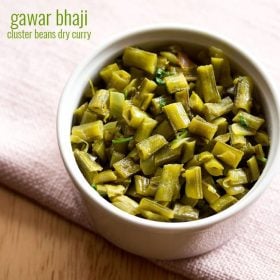Gawar bhaji recipe with step by step photos – A simple healthy recipe of gawar sabzi or a dry curry made from cluster beans, onions, tomatoes and a few spices. It makes for a comforting and tasty meal when served with a side of chapati, raita and pickle.
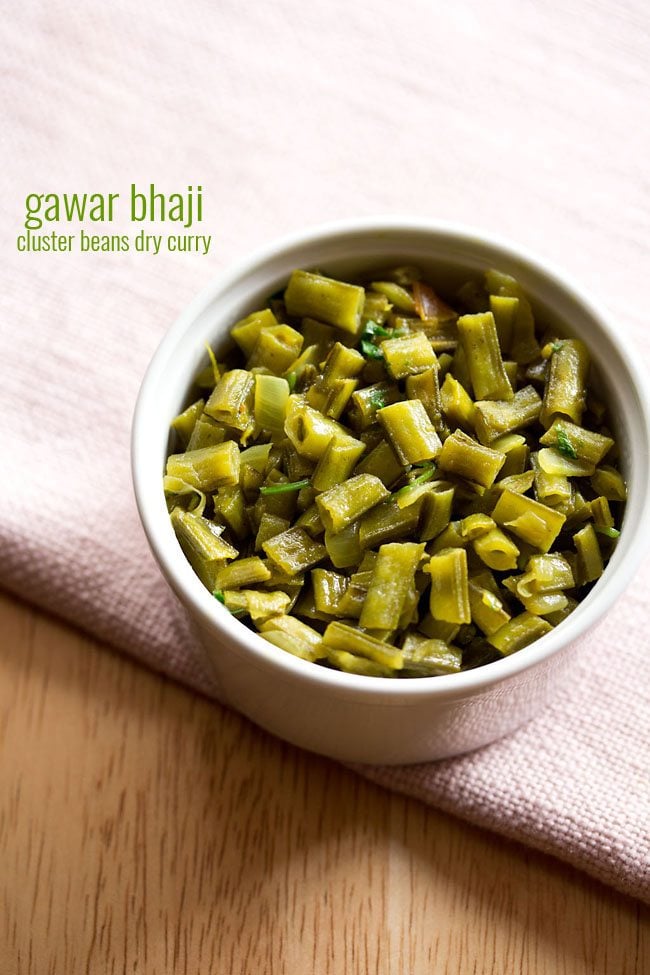
I have been making this gawar bhaji for quite some years now, after learning it from my mom. I make the sabzi as a side dish to go with chapatis or a dal-rice combo. The sabzi is not too much spiced and thus the flavors of cluster beans come through very well in this recipe.
This is a very simple recipe. The only time taking part will be chopping the cluster beans. Once the chopping is done, the rest of the method is easy. The gavar bhaji can also be packed in tiffin box with some chapatis or plain paratha.
You can serve gawar ki sabzi as a side dish with dal rice combo or with curd or some raita.
Step-by-Step Guide
How to make gawar bhaji or cluster beans recipe
1. Rinse 250 grams cluster beans (gavar) very well in fresh water. Use tender beans.
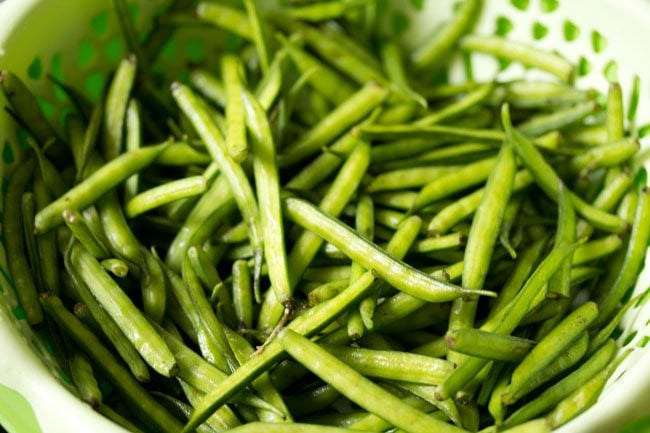
2. Then take each bean and discard the top and bottom ends. Then club some beans together and chop them into small pieces on a chopping board.
Clubbing the beans and chopping them makes this task go easier and faster. Keep them aside.
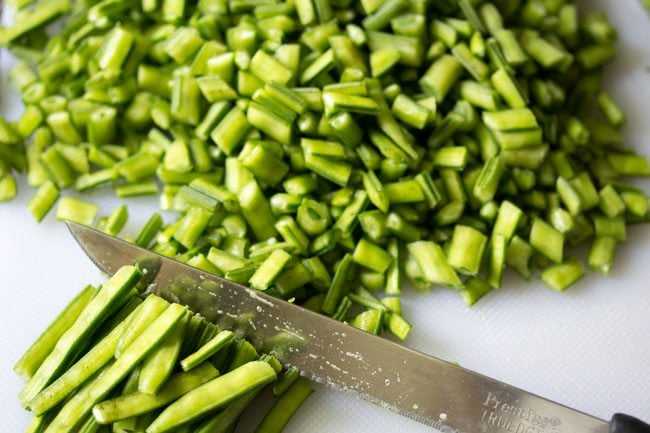
3. Heat 1 tablespoon oil in a shallow frying pan or a shallow kadai. Add ½ cup chopped onions. You can use any neutral flavored oil.
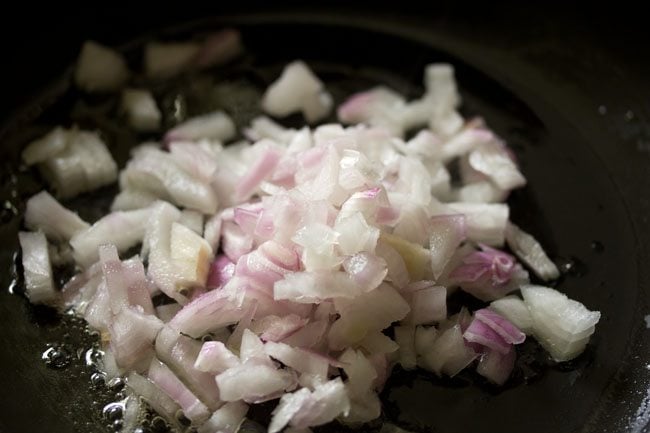
4. Stir the onions and then add 1 green chili (chopped).
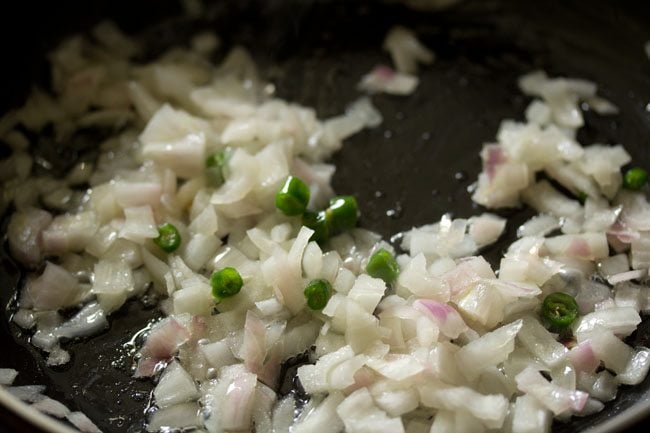
5. Saute till the onions turn translucent stirring often on low to medium heat. Then add ¼ teaspoon turmeric powder and a pinch of asafoetida (hing).
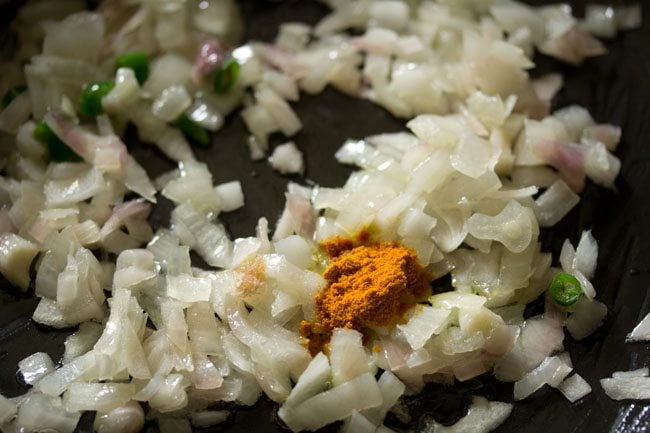
6. Mix the turmeric powder and asafoetida (hing) with the onions.
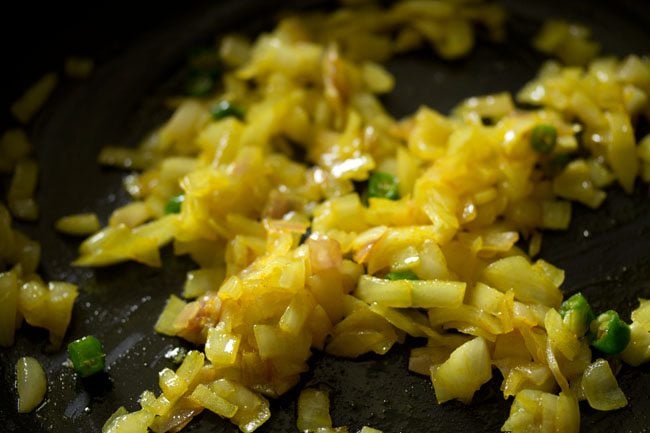
7. Now add ⅓ cup of chopped tomatoes.
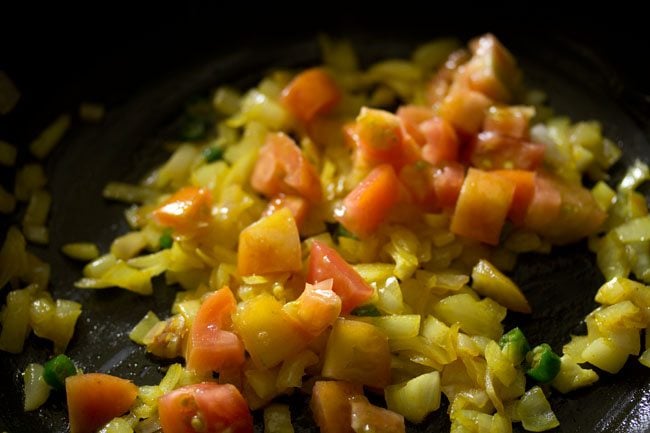
8. Stir and saute the tomatoes. Stir at intervals.
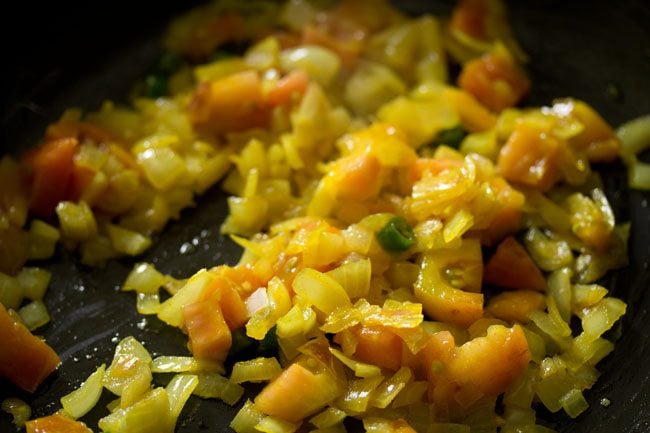
9. Saute till the tomatoes soften a bit on low to medium heat.
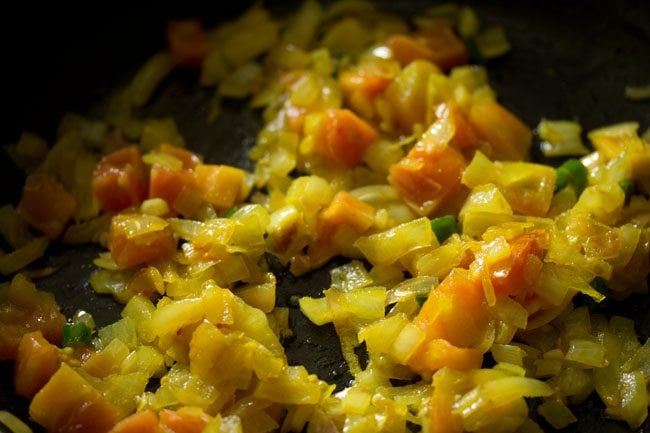
10. Then add the chopped cluster beans. Stir and mix well.
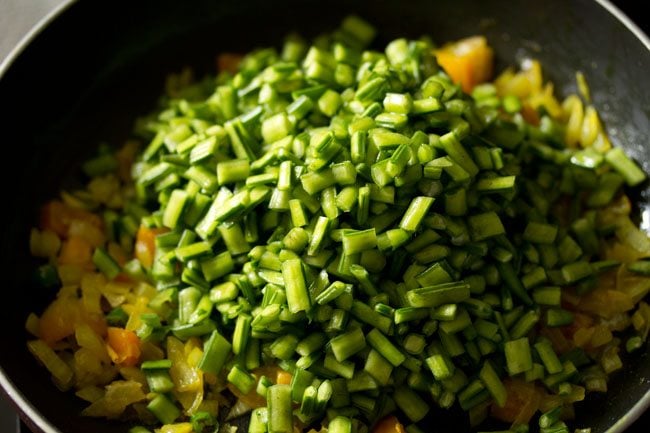
11. Season with salt as required. Stir and mix again everything very well.
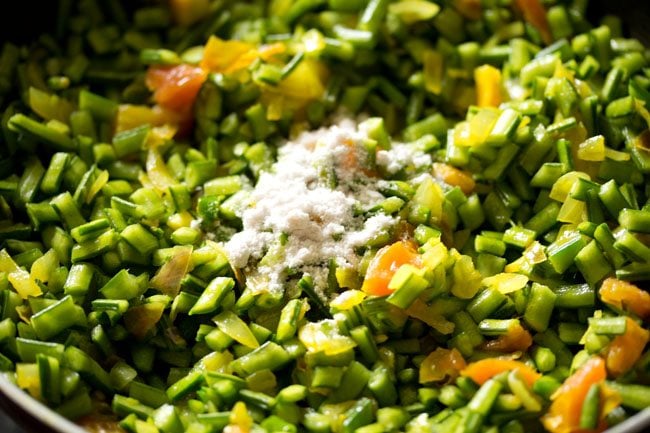
Cooking gawar sabzi
12. Cover the pan with a rimmed lid. Pour water on the lid. The water in the lid, creates steam in the pan and helps in cooking the cluster beans. Cook the beans on sim or a low heat.
Alternatively you can add some water (about ¼ to ⅓ cup) in the pan. Cover with a lid and then cook. If the water dries up whilst cooking and the cluster beans are not cooked, then you can add some more water, in case the water dries.
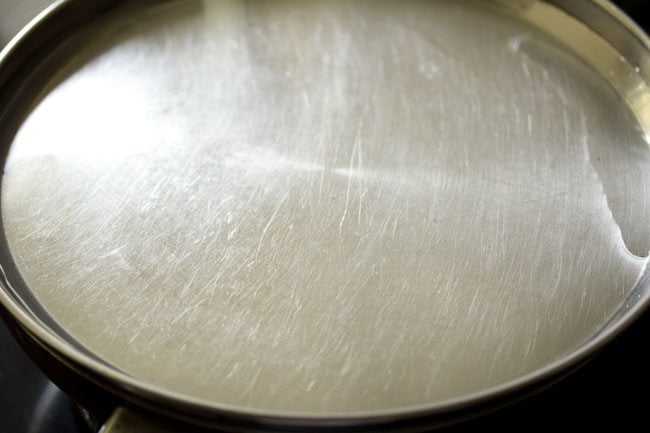
13. Do check the cluster beans after every 8 to 9 minutes, by carefully removing the lid. In case the water dries on the lid, then add some more water and continue to cook the beans.
If you see the beans getting browned, then sprinkle some water in the pan. Usually the beans do not get browned. But depending on the type and quality of pan, the beans can get browned.
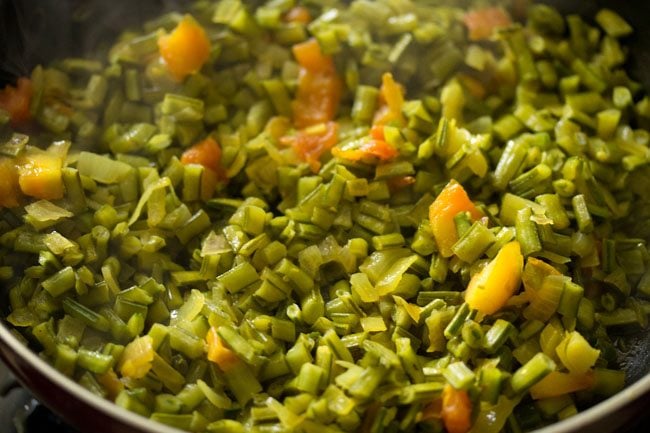
14. Once the beans have cooked well and become tender, switch off the heat. If there is a lot of water or moisture in the pan, then continue to cook the beans without a lid, till all the water has evaporated.
Remember the final preparation is a dry sabji and has no liquids or water.
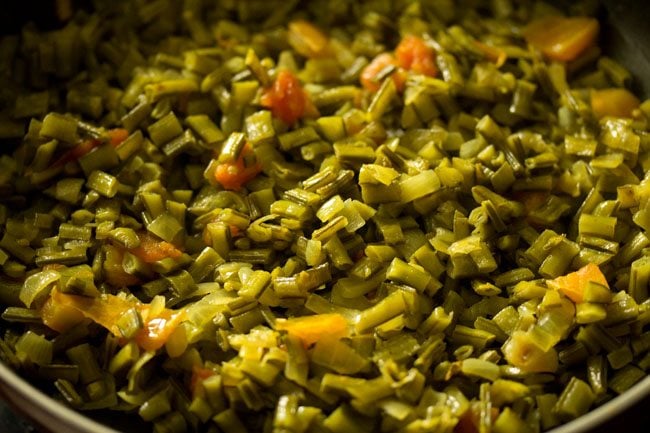
15. Lastly add 1 to 2 tablespoons of chopped coriander leaves. Stir and mix well.
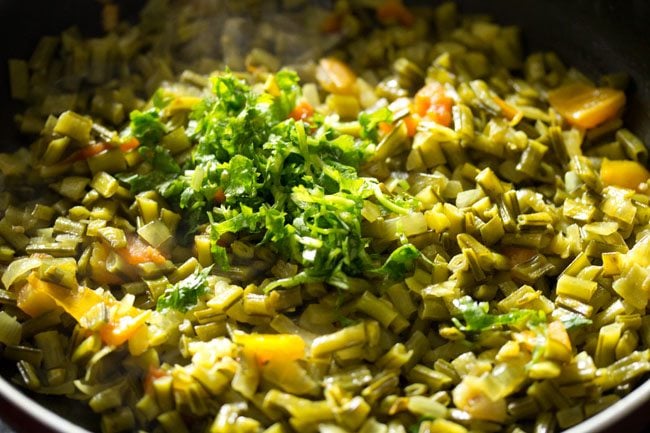
16. Serve gavar bhaji hot or warm with chapatis or paratha or as a side veggie dish with dal-rice.
You can also pack it in a tiffin box with chapati or paratha.
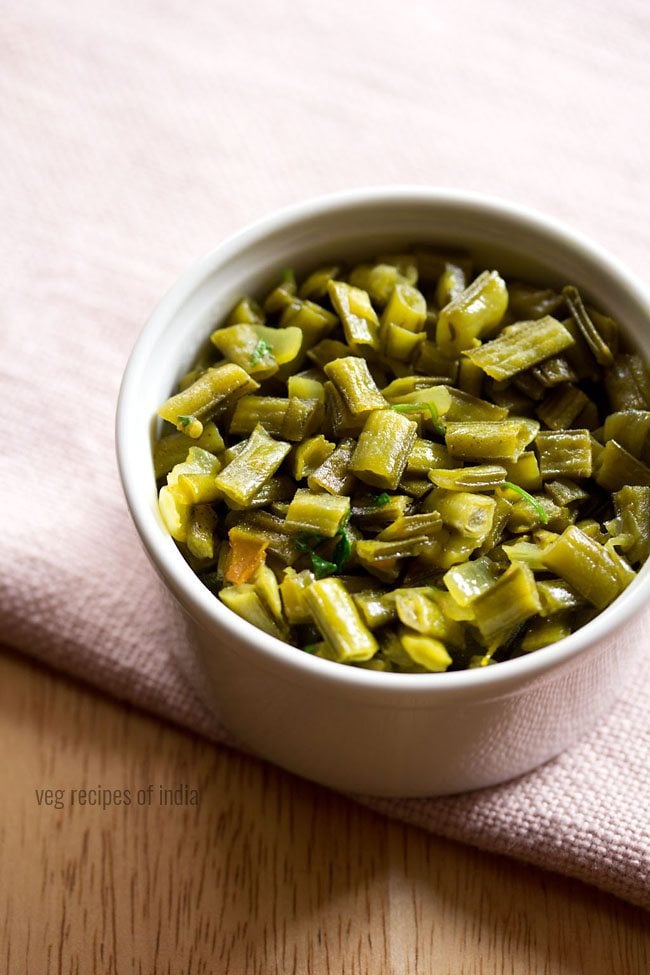
If you are looking for more Veggie recipes then do check:
Please be sure to rate the recipe in the recipe card or leave a comment below if you have made it. For more vegetarian inspirations, Sign Up for my emails or follow me on Instagram, Youtube, Facebook, Pinterest or Twitter.
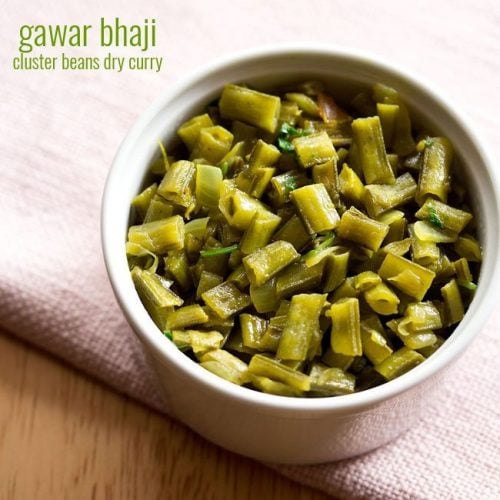
Gawar Recipe | Cluster Beans Recipe
This Gawar ki sabzi is a comforting, healthy and nutritioous dry curry made with cluster beans, onions, tomatoes and few spices.
Prep Time 15 mins
Cook Time 30 mins
Total Time 45 mins
Prevent your screen from going dark while making the recipe
Preparation for gawar ki sabzi
Rinse cluster beans/gavar very well in water.
Then take each bean and discard the top and bottom ends. Then club some beans together and chop them in small pieces. Clubbing the beans and chopping them makes this task go easier and faster. Keep aside.
Making gawar ki sabzi
Heat oil in a shallow frying pan or a shallow kadai. Add chopped onion.
Stir the onions and then add 1 green chili (chopped).
Saute stirring often till the onions turn translucent and then add turmeric powder and a pinch of asafoetida (hing).
Mix the turmeric powder and asafoetida with the onions.
Now add chopped tomatoes.
Stir and saute the tomatoes, till they soften a bit.
Then add the chopped cluster beans. Stir and mix well.
Season with salt as needed. Mix again everything very well.
Cooking gavar sabzi
Cover the pan with a rimmed lid. Pour water on the lid. The water in the lid, creates steam in the pan and helps in cooking the cluster beans. Cook the beans on sim or a low flame.
Alternatively you can add some water (about ¼ to ⅓ cup) in the pan. Cover with a lid and then cook. If the water dries up whilst cooking and the beans are not cooked, then you can add some more water, in case the water dries.
Do check the beans after every 8 to 9 minutes, by carefully removing the lid. In case the water dries on the lid, then add some more water and continue to cook the beans.
If you see the beans getting browned, then sprinkle some water in the pan. Usually the beans do not get browned. But depending on the type and quality of pan, the beans can get browned.
Once the beans have cooked well and become tender, switch off the heat. If there is a lot of water or moisture in the pan, then continue to cook the beans without a lid, till all the water has evaporated.
Lastly add chopped coriander leaves. Stir and mix well.
Serve gavar bhaji hot or warm with chapatis or as a side veggie dish with dal-rice.
- This recipe can be scaled as per your requirements.
- Use fresh, tender and green cluster beans. Make sure the beans are not matured.
- You can use any neutral-flavored oil.
Nutrition Facts
Gawar Recipe | Cluster Beans Recipe
Amount Per Serving
Calories 75 Calories from Fat 45
% Daily Value*
Fat 5g8%
Saturated Fat 1g6%
Polyunsaturated Fat 1g
Monounsaturated Fat 4g
Sodium 440mg19%
Potassium 89mg3%
Carbohydrates 14g5%
Fiber 1g4%
Sugar 2g2%
Protein 3g6%
Vitamin A 149IU3%
Vitamin B1 (Thiamine) 1mg67%
Vitamin B2 (Riboflavin) 1mg59%
Vitamin B3 (Niacin) 1mg5%
Vitamin B6 1mg50%
Vitamin C 47mg57%
Vitamin E 2mg13%
Vitamin K 2µg2%
Calcium 118mg12%
Vitamin B9 (Folate) 128µg32%
Iron 1mg6%
Magnesium 44mg11%
Phosphorus 61mg6%
Zinc 1mg7%
* Percent Daily Values are based on a 2000 calorie diet.
This Gawar Bhaji post from the archives first published in August 2016 has been republished and updated on December 2022.
Source link


